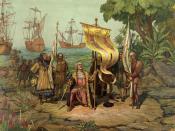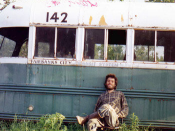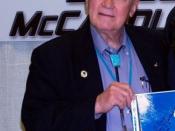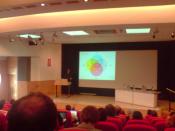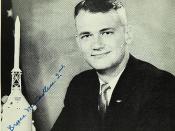Many people define wilderness as a place away from civilization, nature. A place in the wild where one can think without being disturbed by anything except the rising sun and burbling brooks. Webster's defines wilderness as "a tract or region uncultivated and uninhabited by human beings." Throughout time, man has always considered these definitions correct however wilderness is a state of mind; one which takes great discipline and devotion to achieve. Although this state of mind may be more easily accomplished in the great outdoors, wilderness can be experienced anywhere. Through the lenses of Christopher McCandless, a young adult exploring western America, and Christopher Columbus, the infamous explorer, the concept of achieving wilderness will be investigated.
In 1492, Columbus rediscovered the Bahamas. Before his journey, Columbus convinced the royalty of Spain the earth was round and much smaller than it was thought to be, therefore there must be a faster, more direct way to India, the land of great riches.
Although the explorer had unfounded ideas, his main goal was to become rich; he was looking for a way to ameliorate his own life. Immediately after coming into contact with the "Indians", he claimed the land and goods, killed some people, and subjected others to slavery; all in the "name of God". Columbus was never in it to learn things about him or have fun. He was there to get rich and get out.
Almost five hundred year later, a young man by the name of Chris McCandless set out from his home to live life and not be held down by any rules. He would venture to all parts of western and mid-western America, as well as Mexico. Living by his heart and not his head, McCandless visited Alaska, searching for an answer. Just after he discovered what life is all about, McCandless starved to death in the Alaskan Bush.
Both explorers had ideas of wilderness, however they were extremely antipodean. McCandless was retreating from modern life, while Columbus created it. In a sense they were both looking for answers and self-benefit, but again the central reasons were completely opposite. Many themes influenced these ideas; literature and money, religion, purpose, and of course views of the wild persuaded both McCandless and Columbus to venture "Into the Wild".
Columbus grew up with very little schooling, but was a genius with the sea. As a young child, he frequently got rides ships and drew maps of a round world. These theories led him to conclude there was in fact a faster way to the "Spice Worlds," presently known as India. He would try to receive funding for a voyage to the new land. After many difficulties, and through a combination of good luck and persuasiveness, he gained the support of the Catholic monarchs, Isabel and Fernando. Soon after, Columbus set sail, heading westward. The navigator had excellent seamanship and strong persistence, however he lacked leadership skills and an open mind. When arriving on San Salvador, Columbus took control of the lives of the natives. He was not an observer of nature and in fact immediately thought of the land as a resource and the people as his possessions. "Our [humans at the time of Columbus] trouble with the New World "" a world that was intended to refuel an Old World which has in some sense grown effete "" has been that from the beginning we have imposed, not proposed." (1992 Lopez, p. 18) We never asked the land if we could farm it, or ask the animals if we could kill them, or ask the natives if we could rob them of life, we just did it. "We bent to our will whatever resisted." (1992 Lopez, p. 18) Chris McCandless obtained a college education, against his own will, and was extremely smart with an interesting background. After loosing respect for his father and living with parents that worked non-stop, Chris learned to be independent. He spent much of his youth as an entrepreneur and carefully counted his earnings, not to be greedy, but to be organized. McCandless loved the life of a hermit, and always lived off the land with little money, and almost no resources. His personality attracted every type of person to lend him a helping hand. Respect and knowledge of the land along with its environment were well-respected rules. He was a diamond in the rough. With a lot of luck and a strong will, Chris managed to love even the harshest states of the wild.
During the time of Columbus, religion played a large role in the culture of the people, especially in Europe. Catholicism flourished; the main goal of the religion was to convert members of other religions to believe and practice in this superior form of Christianity. When Columbus found many people not part of the Catholic religion, he did not understand they already posses their own religion and way of life. He could not understand there were people different than he; who speak different languages and practice different cultures. Columbus brought his life to the Bahamas, and attempted to adapt his ways in a foreign world. His possessed and extremely closed mind, and never thought these people just did not understand what Columbus and his men were saying and doing. Although he was an excellent navigator and sailor, he was probably the last man on Earth who should start a New World.
McClandless does exactly the opposite; he uses the culture and ways of the wild and transforms his life to fit the mold of the wilderness. Evidence of God in McCandless' life was very uncommon. Every once in awhile he mentions God, but Chris never really used religion as an alcove; and never depended on it like Columbus. But much of that is due to the structure of society presently. Some of the differences between Columbus and McCandless come from these changes in culture, however the minds of these two are still very different.
Columbus was undoubtedly seeking new land. "Columbus believed in a personal relationship with God. He became convinced that it was His will that he should be the one to open the western route to Asia. But he was poor and nations were jealous of high-sea ventures by been of other countries. He needed money and he needed the protection of some mighty prince." (1975, Albury, pp. 23-24) His quest to become rich and famous was a predominant concept in the mind of Columbus.
Some say the young vagabond was escaping from a corrupt society. Others argue he is searching for answers regarding his inner being. Chris is retreating, fleeing and finding. "Two years he walks the earth. No phone, no pool, no pets, no cigarettes. Ultimate Freedom. An extremist. An Aesthetic voyager whose home is the road." (1996, Krakauer, p. 163). McCandless enjoyed and cherished the time he spent alone, on the road. The word escape is used frequently in the text, but ultimately Chris finds the answer to his question and decides to return home. While in the wild, Chris experienced wilderness, thus was able to locate the answer he had been searching for. He ventured in to the Alaskan Bush only to achieve total wilderness and discover "HAPPINESS ONLY REAL WHEN SHARED." (Krakauer, 1996, p. 189) Though both Columbus and McCandless were searching for wilderness (both have different definitions), only McCandless was able to discover what he had been looking for. In this way, he is a stronger moral character and has a more just heart. Columbus was searching for riches, land which he could gain money, and people whom he could make slaves. Columbus' mind leads his heart in all ways, while McCandless has the self-discipline to primarily follow his heart.
